On 20 March Operation Outward, one of the more unusual projects in the war, began. This was a British plan to launch hydrogen-filled balloons at Germany: some trailed a long wire to snag on power lines and cause short-circuits, while others were fitted with incendiary devices to start forest fires. By August they would be launched at a rate of 1,000 a day. Also this week, General Douglas MacArthur arrived in Darwin, Australia on 17 March, as supreme commander of Allied forces in the Southwest Pacific, and Britain introduced rationing of electricity, coal and gas; the clothing allowance was also decreased.
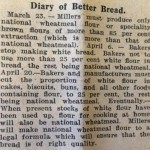
As well as rationing being extended, the John O’Groat Journal reported this week that the type of flour used in baking would now be regulated. Among other measures soon to be introduced, bakers would no longer be permitted to produce white bread, and would not be able to use more than 25 percent white flour in bread, cakes, biscuits and buns – and once stocks of white flour ran out, these would be made entirely from wholemeal. (The reason was that white bread only used 75 percent of the wheat, whereas wholemeal used 85 percent, and was therefore far more efficient.)
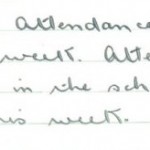
As spring was in the air of Caithness – albeit along with rain, snow and the occasional German raider – schools began to turn their attention to their gardens, and the Dig for Victory campaign. Bilbster School recorded in the school log book for 20 March: “Digging in the school garden was started this week.”
 Pulteneytown Academy School in Wick, however, was still troubled by persistent air raids, and it seems that some pupils saw an opportunity for an extra half day holiday. The Head Teacher noted on 20 March: “’Alert’ sounded 10.35 a.m. School evacuated. ‘All clear’ sounded 11 a.m. re-assembled 11.15 a.m. but all the scholars did not return.”
Pulteneytown Academy School in Wick, however, was still troubled by persistent air raids, and it seems that some pupils saw an opportunity for an extra half day holiday. The Head Teacher noted on 20 March: “’Alert’ sounded 10.35 a.m. School evacuated. ‘All clear’ sounded 11 a.m. re-assembled 11.15 a.m. but all the scholars did not return.”
Mines were still a serious hazard along the Caithness coast. On 17 March Wick Coastguards notified the police 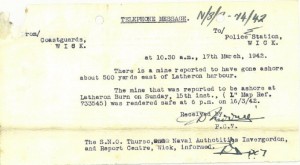 that, “There is a mine reported to have gone ashore about 500 yards east of Latheron harbour. The mine that was reported to be ashore at Latheron Burn on Sunday, 15th inst. … was rendered safe at 6 p.m. on 16/3/42.”
that, “There is a mine reported to have gone ashore about 500 yards east of Latheron harbour. The mine that was reported to be ashore at Latheron Burn on Sunday, 15th inst. … was rendered safe at 6 p.m. on 16/3/42.”
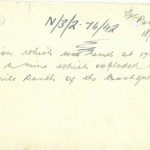 The next day the Coastguards telephoned the police with another update, this time about a mine in Wick harbour: “The explosion which was heard at 17.30 hrs on this date was caused by a mine which exploded on the rocks about ½ a mile south of the Coastguard Station, South Head, Wick.”
The next day the Coastguards telephoned the police with another update, this time about a mine in Wick harbour: “The explosion which was heard at 17.30 hrs on this date was caused by a mine which exploded on the rocks about ½ a mile south of the Coastguard Station, South Head, Wick.”
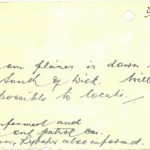
Finally this week, the Controller of R.A.F. Wick contacted the police with the following alarming message: “One of our planes is down somewhere 6 miles south of Wick. Will you do everything possible to locate.” The message contains the note: “Inspector Allen informed and he is to send one patrol car. Constable Green, Lybster, also informed.”
